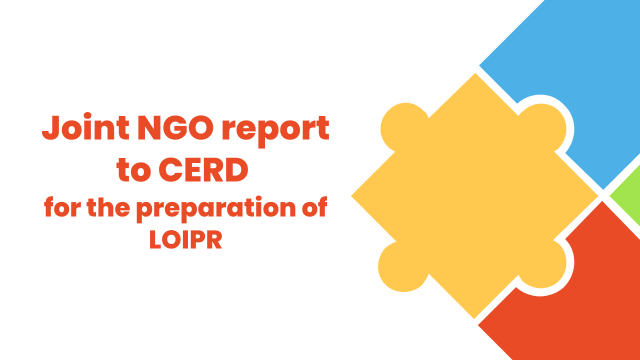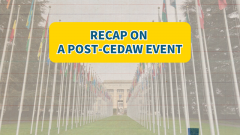Transitional justice in Sri Lanka (HRC45, 2020, Joint-OS)
September 17, 2020
IMADR delivered the joint oral statement on “Transitional justice in Sri Lanka” at the 45th session of the Human Rights Council. Whole text can be read below or download here.![]()
Co-sponsors of the statement are: Amnesty International; Asian Forum for Human Rights and Development (FORUM-ASIA); Franciscans International; and Human Rights Watch.
———
Joint oral statement: 45th session of the Human Rights Council
Item 3: Interactive dialogue with the Special Rapporteur on the promotion of truth, justice, reparation and guarantees of non-recurrence
17 September 2020
Thank you, Madam President.
We thank the Special Rapporteur for presenting the much-awaited report on Sri Lanka. To supplement the information in the report, we wish to highlight a series of recent key developments in the country’s transitional justice process.
Since the election of President Gotabaya Rajapaksa in November 2019, the Sri Lankan government has adopted policies directly at odds with the recommendations contained in your report. In February[1] and July[2] this year, we drew this Council’s attention to the promotion of several military officers who, according to the findings of various UN investigations, may bear criminal responsibility for crimes under international law; to the establishment of a Commission of Inquiry into alleged “political victimisation” of those accused of serious human rights violations; and to the assignment of the Ministry of Defence as the oversight body for NGOs as a function under the State Minister of Internal Security, Home Affairs and Disaster Management with the special priority to regulate non-NGOs[3], among others concerns.
The Tamil and Muslim minorities are being further marginalized by increased state patronage for Sinhala Buddhist nationalism. For instance, the Presidential Task Force for the Archaeological Heritage Management in the Eastern Province[4] currently includes six Buddhist monks but no representatives from other religious communities, despite the multi-ethnic nature of the province.
Following former President Sirisena’s pardon in 2019 of the secretary of Bodu Bala Sena (BBS) Galagoda Aththe Gnanasara Thero convicted of contempt of court in relation to the enforced disappearance of journalist Prageeth Eknaligoda, President Rajapaksa in March this year pardoned former army sergeant Sunil Ratnayake, who was indicted in 2002, convicted and sentenced to death in 2015 for the murder of eight Tamil civilians including children at Mirusuvil in 2000. On appeal, a five-judge bench of the Supreme Court unanimously upheld the High Court’s conviction and sentence.[5]
On 9 July, the police tried to obstruct a memorial event commemorating those killed by the 1995 Sri Lankan Air Force bombing of St. Peter’s Church in Navaly, even after the court had denied the police’s request for an interim order to ban the commemoration. Similarly, the police, often acting on interim orders from magistrates, have repeatedly tried to obstruct protests organised by the families of the disappeared, most recently, protests held in the north and east of Sri Lanka on the International Day of the Victims of Enforced Disappearances.
Shortly after the general election in August, the Sri Lankan government gazetted a proposed 20th amendment to the constitution on 2 September. Among a number of provisions that threaten the independence of the judiciary, the right to a remedy and the right to a fair trial; it gives the president unfettered power to appoint senior judges, the attorney-general, and members of independent commissions and other offices including the Human Rights Commission. In making these appointments, the President is merely required to seek the observations of a Parliamentary Council which will replace the Constitutional Council.[6] Furthermore, it significantly broadens the scope of presidential immunity.[7] If passed by parliament, the proposed amendment will significantly expand the powers of the executive presidency and weaken the independence of the judiciary and independent commissions.
We are gravely concerned by the series of regressive steps and by signs of further backtracking on reconciliation, accountability, and human rights in Sri Lanka. Given this deteriorating human rights situation and the Sri Lankan government’s withdrawal from Resolution 30/1 and 40/1, we reiterate our call to the Human Rights Council to establish an international accountability mechanism on Sri Lanka. Moreover, we urge the Special Rapporteur to closely follow-up on the country situation in coordination with other special procedures mandate holders.
Thank you.
[1] https://imadr.org/wordpress/wp-content/uploads/2020/02/Joint-Oral-Statement_HRC43_Item-2_GD_Sri-Lanka_28Feb2020.pdf
[2] https://imadr.org/wordpress/wp-content/uploads/2020/07/Joint-Oral-Statement_HRC44_Item-3_ID_SR-FoAA.pdf
[3] http://documents.gov.lk/files/egz/2020/8/2187-27_E.pdf
[4] Gazette Extraordinary no. 2178/17
[5] https://www.amnesty.org/en/documents/asa37/2247/2020/en/
[6] Twenties Amendment to the Constitution, Article 41A (1), available at: https://www.parliament.lk/uploads/bills/gbills/gazette/english/6176.pdf
[7] Ibid, Article 35 (1)





